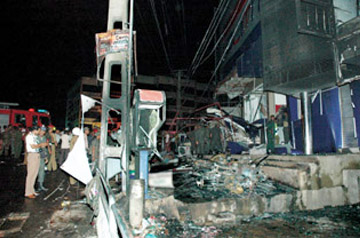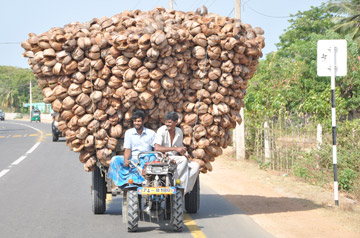|
Opinion:
Cameron eats his own words
by K.M.H.C.B. Kulatunga
It seems that the British Prime Minister is now eating his own words
after unilaterally setting deadlines upon Sri Lanka on the alleged war
crimes. Having told Sri Lanka that he would give time until March next
year, for Sri Lanka to hold its own investigation on alleged human
rights violations, Cameron finally had to admit the peaceful situation
in Sri Lanka when he had to face barrage of questions in the British
Parliament on his return to London.
 |
| The scene
outside a clothing shop after a parcel bomb placed by Tiger
terrorists exploded. Pic: Sudath Nishantha (File photo) |

Two youth transporting coconut husks to a coir factory in the
North. |
Having made many negative comments on Sri Lanka during his stay here,
Cameron finally had to admit the peaceful environment that prevails here
and that the country has so much of potential and grown. When his
Opposition legislature questioned whether Britain would entertain asylum
seekers from Sri Lanka, Cameron played a different melody, saying that
Sri Lanka is safe and has a peaceful atmosphere after the eradication of
terrorism.
War crimes
It was the British who invaded Sri Lanka and brutally killed
thousands of Sinhalese in 1818. Before asking Sri Lanka to have an
investigation on alleged human rights violations of the LTTE terrorists
killed in action, Britain must have a credible investigation on the war
crimes they have committed here and acts against mankind when invading a
sovereign nation such as Sri Lanka.
It won't be a surprise if somebody says that Sri Lanka should give
time to British Prime Minister until March 2014 to have a credible
investigation on the war crimes committed by British Forces in 1818 and
that Sri Lanka must take it up at the next UNHRC sessions in Geneva.
If Cameron argues that those are a thing of the past, then we have
enough and more examples on human rights violations by the British
Forces in recent times. Hence, Britain must clear the loads of rubbish
in their own backyards before pointing an accusing finger on Sri Lanka.
IRA
Soldiers from an undercover unit of the British Army in Northern
Ireland killed scores of unarmed civilians. Speaking publicly for the
first time, the ex-members of the Military Reaction Force (MRF), which
was disbanded in 1973, have said they had been tasked with 'hunting
down' IRA members in Belfast.
The details emerged a day after Northern Ireland's Attorney General,
John Larkin, suggested ending any prosecutions over troubles-related
killings that took place before the signing of the Good Friday Agreement
in 1998. The former members of the Military Reaction Force have said
that their group consisted of about 40 men handpicked from across the
British Army.
Three former members of the unit have said they had posed as Belfast
City Council road sweepers, dustmen and even "meths drinkers", carrying
out surveillance from street gutters. One of the soldiers said they had
also fired on suspected IRA members.
Another former member of the unit has said that they never wore
uniforms and few people knew what rank anyone was anyway. In 1972 there
had been more than 10,600 shootings in Northern Ireland.
The former members have said that it is not possible to say how many
killings the unit was involved in. The MRF's operational records have
been destroyed and its former members refused to incriminate themselves
or their comrades in specific incidents. But they have admitted shooting
and killing unarmed civilians.
Genocidal magnitude
Cameron's accusations contradicts the UK's conduct in recent times as
a US ally in the NATO forces in Iraq and Afghanistan which had left
thousands of hapless civilians innocent victims of war. These
accusations on Sri Lanka comes from the man both covering up the genesis
of massacres of genocidal magnitude - and who enjoined in the near
destruction of Libya, the resultant lynching of the country's leader,
the murder of his sons and small grand children and uncounted others in
another decimation of a country who had threatened no other, an article
published in the Global Research stated. Cameron's Libya, is Blair's
Iraq. As Iraq, the dying continues daily.
The pontification also from a Prime Minister backing funding for the
cannibalistic orientated insurgents in Syria, the beheading,
dismembering, looting, displacing, kidnapping, chemical weapons
lobbying, child killing, infanticide-bent crazies, including those from
his own country.
During his short say in Sri Lanka Cameron demanded the country ensure
"credible, transparent and independent investigations into alleged war
crimes" and said if this did not happen by the March next year - the
deadline he arbitrarily imposed, he would press the UN Human Rights
Council to hold an international inquiry. Further: "truth telling", he
said, was essential. To cite hypocrisy of breathtaking proportions has
become a redundant accusation, but words are failing.
Set an example
As President Mahinda Rajapaksa told the final news conference during
CHOGM 2013, people in glass houses shouldn't throw stones. If Cameron is
honestly concerned about human rights, he must first and foremost set an
example by ordering credible investigations against ethnic cleansing by
the British Forces in Sri Lanka two centuries ago and then the acts
against the mankind by the British Forces.
It is a pity that Cameron has ignored the fact that Sri Lanka is the
only country in South Asia rated high on the Human Development Index.
The UK and allies recent victims, Iraq, Libya, Afghanistan barely make
it to the bottom.
Cameron flew back to London, grappling with how to evade delivering
truth to the Chilcot Inquiry. It was none other than the British
taxpayers who funded the Chilcot Inquiry, and they would wants their
money's worth.
British Prime Minister Cameron was pontificating Sri Lanka on
transparency when his Government is yet to prove it.
Ironically on 31st October 2006, David Cameron voted in favour of a
motion brought by the Scottish National Party and Wales' Plaid Cymru
("The Party of Wales") calling for an Inquiry into the Blair
government's conduct of the Gulf war. On June 15, 2009, in a
parliamentary debate, the terms of the Chilcot Inquiry were presented in
detail, duly recorded in Hansard, the parliamentary records.
Inquiry
This is what the then Leader of Opposition Cameron said; "The whole
point of having an Inquiry is that it has to be able to make clear
recommendations, to go wherever the evidence leads, to establish the
full truth and to ensure that the right lessons are learned... in a way
that builds public confidence"
"The inquiry needs to be, and needs to be seen to be, truly
independent and not an establishment stitch-up... The Prime Minister was
very clear that the inquiry would have access to all British documents
and all British witnesses. Does that mean that the inquiry may not have
access to documents from the USA ... On the scope of the inquiry, will
the Prime Minister confirm that it will cover relations with the United
States," Cameron had said by concluding his speech, demand for openness
and transparency once again.
Though the West makes a big hue and cry over media freedom, Cameron
conducted his GHOGM press conference in his own style. A few top row
seats were kept 'reserved' after those who had sat in those seats were
chased away.
When Cameron walked into the press conference head table, his
favourite media personalities too walked along with him and occupied in
those front row seats that were kept reserved for them.
The cat came out of the bag when Cameron opened the floor for
questions - but from only his selected media personalities. He insisted
that they could start from Sky News. Only one local media personality
was able to ask questions. Hard critics of British policy in the local
media were prevented from asking questions from Cameron. Is this the
media freedom the West is practicing?
Unforgettable lesson
Full credit should go to legendary cricketer Muttiah Muralitharan for
the manner in which he opened the eyes of Cameron.
After a short tour of the North and meeting only a few LTTE
sympathisers who posed as ordinary Tamil citizens, Cameron had returned
to Colombo with a negative picture.
But in his meeting with Cameron at CCC grounds last Saturday, Murali
taught the British premier an unforgettable lesson.
Murali enlightened the British Prime Minister and said that the North
has improved and developed by more than 1,000 percent. Though he looked
shocked at once, Cameron himself had later admitted that Murali was
right.
Murali had another doosra at the controversial Channel 4 who is
notorious for doctored video clippings. When Channel 4 tried and failed
to use Murali and get critical comments from the celebrated cricketer,
the notorious Macrae and his team cut short the 45-minute television
interview they had with the world record holder to less than four
minutes.
Muralitharan later said today that Channel 4 had lost its credibility
in his eyes due to airing an edited clip of an interview which distorted
the context he spoke in.
"It was unethical for them to edit three minutes of a 45 minute
interview and air it. Channel 4 lost all credibility in my eyes," Murali
was quoted as saying. When questioned as to if the journalists assured
him of airing the entire interview prior to agreeing on the interview,
he replied in the affirmative.
There is no doubt that Cameron had overstepped his limits and
Commonwealth protocol in intimidating the host nation. He has no right
whatsoever to act in such undiplomatic manner and set headlines to Sri
Lanka.
|

